
The Genesis of the Pandemic-Period Education Catastrophe and the Worldwide Commission to Educate All Kids (Post-Pandemic):
The biggest and most consequential human catastrophe of the Covid-19 pandemic period, by far, is that of education. This catastrophe is also arguably still the least understood, in its core dynamics.
This education catastrophe has two key dimensions:
- The mass ouster, around the world, and often permanently, of some half a billion children from all forms of education (what we now call “third bucket kids”)
- The widespread destabilization and disruption of school systems and academic trajectories for billions of children around the world.
The World’s Half-Billion Third Bucket Children
A “third bucket kid” is one who is in neither Bucket 1 (“physical” or “classical” school) nor Bucket 2 (“online” or “virtual” school). He/she is in no school at all, receiving no education at all. Full stop.
The Covid-19 pandemic saw the largest-ever simultaneous, largely improvised policy move in history – to wit, the mass closure of schools, in March 2020, across much of the world. That first mass closure, in scores of countries on all continents, was followed by multiple prolonged school closures and many other very human dynamics that succeeded in “ousting” (into the “third bucket”) hundreds of millions of children from all forms of schooling around the world.
How many kids are in the third bucket as a consequence of the pandemic period and the collapse of school systems? The work of the Commission over two-plus years estimates over half a billion kids, between kindergarten and Grade 12, in the third bucket.
At this scale, two huge consequences are at play:
- 1. A third bucket kid – with no education, or suffering from severe undereducation – will, in a socially and economically more difficult post-pandemic world, have far poorer life outcomes (including greatly diminished earning capacity) and life expectancy than his/her educated counterparts
- 2. Entire societies, countries and regions around the world will be destabilized in virtue of huge uneducated or undereducated underclasses that did not exit prior to the pandemic
This means that the education catastrophe – in its most pathological, third-bucket form – is arguably the most underappreciated, time-urgent catastrophe of the entire pandemic period. If these children (elementary and secondary levels alike) are not found and reintegrated into schooling with the greatest possible speed, they simply cannot succeed. In many cases, they will not have the skills, training and tools to survive in the post-pandemic world – a poorer, harsher world for the foreseeable future. The large-scale destabilization that will inevitably come through the emergence of massive new underclasses will have major security and social solidarity implications for the balance of the century.
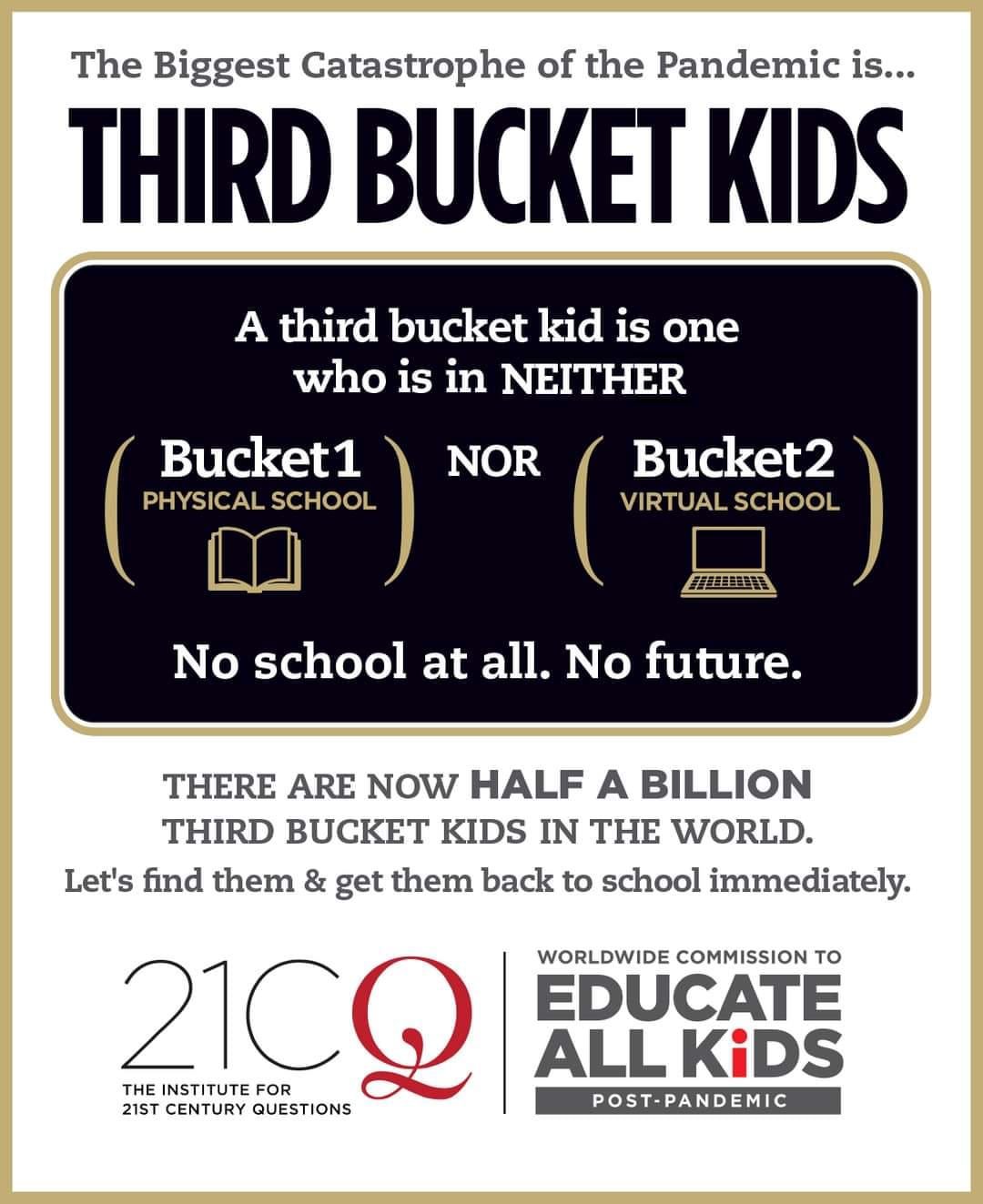
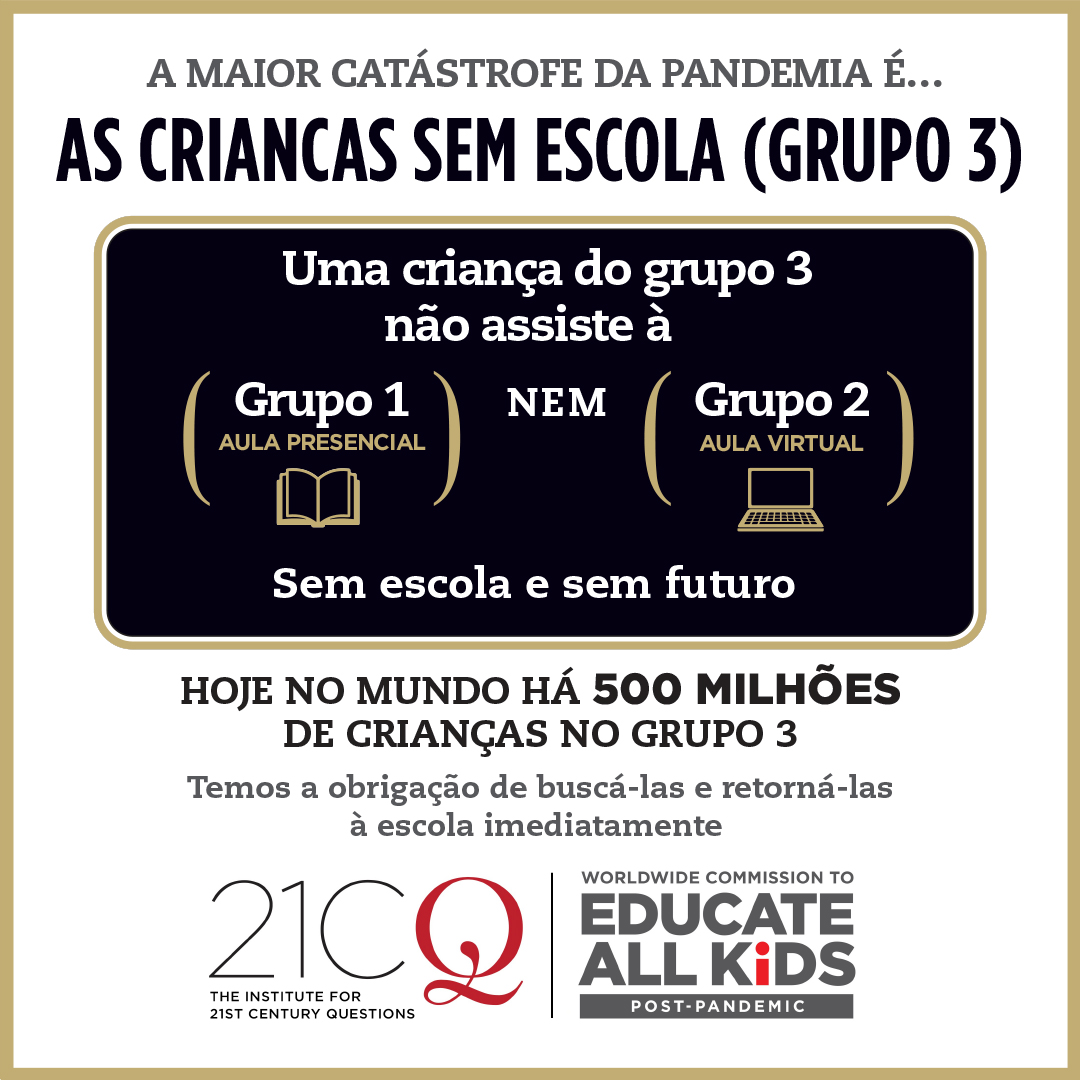
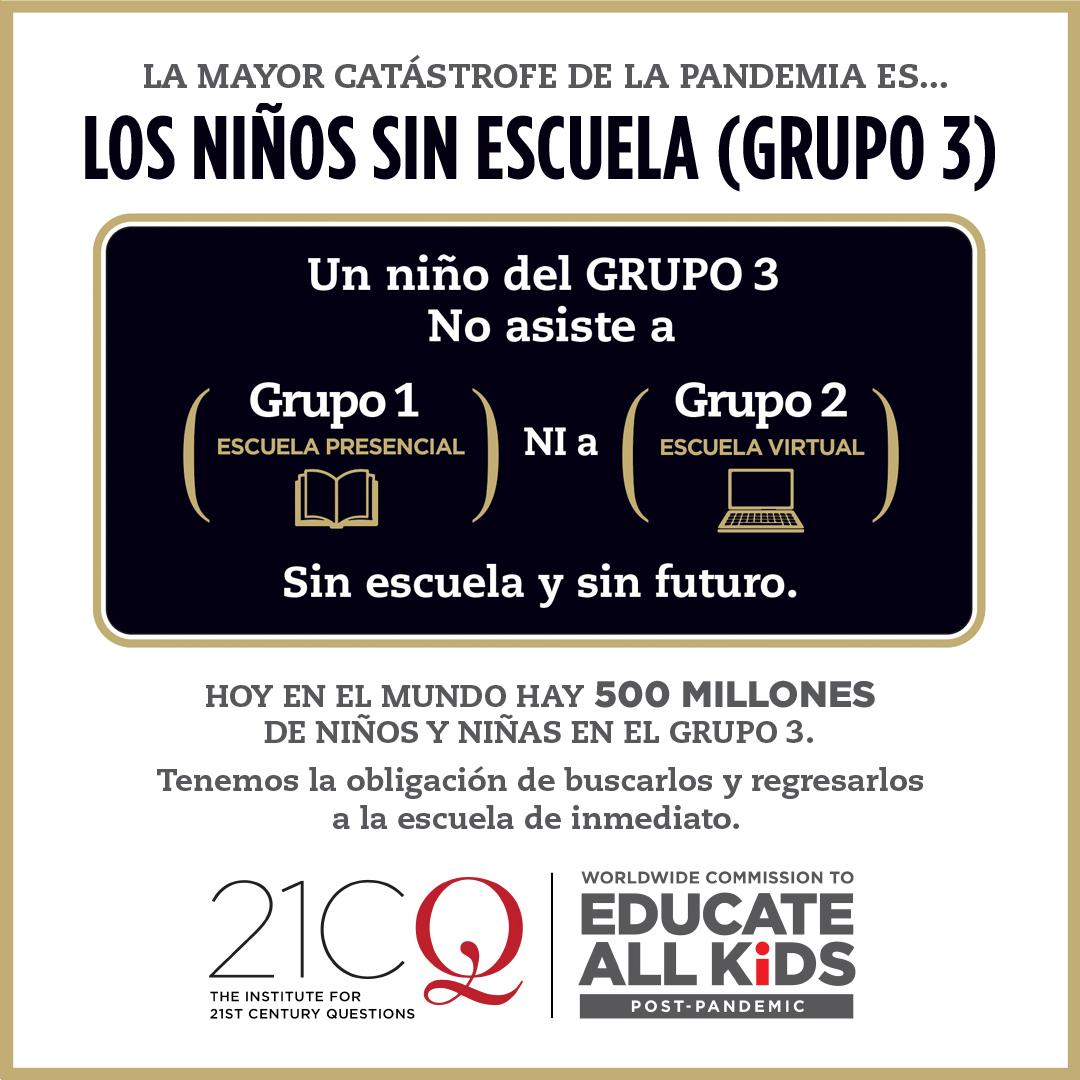
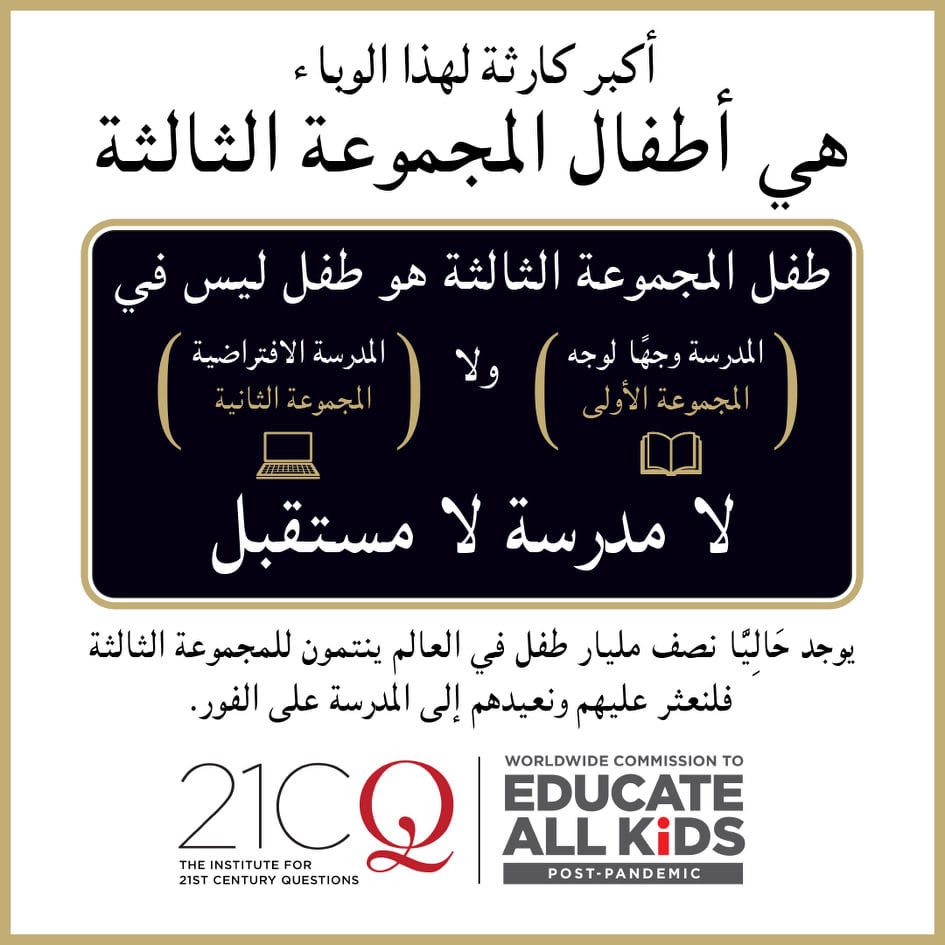
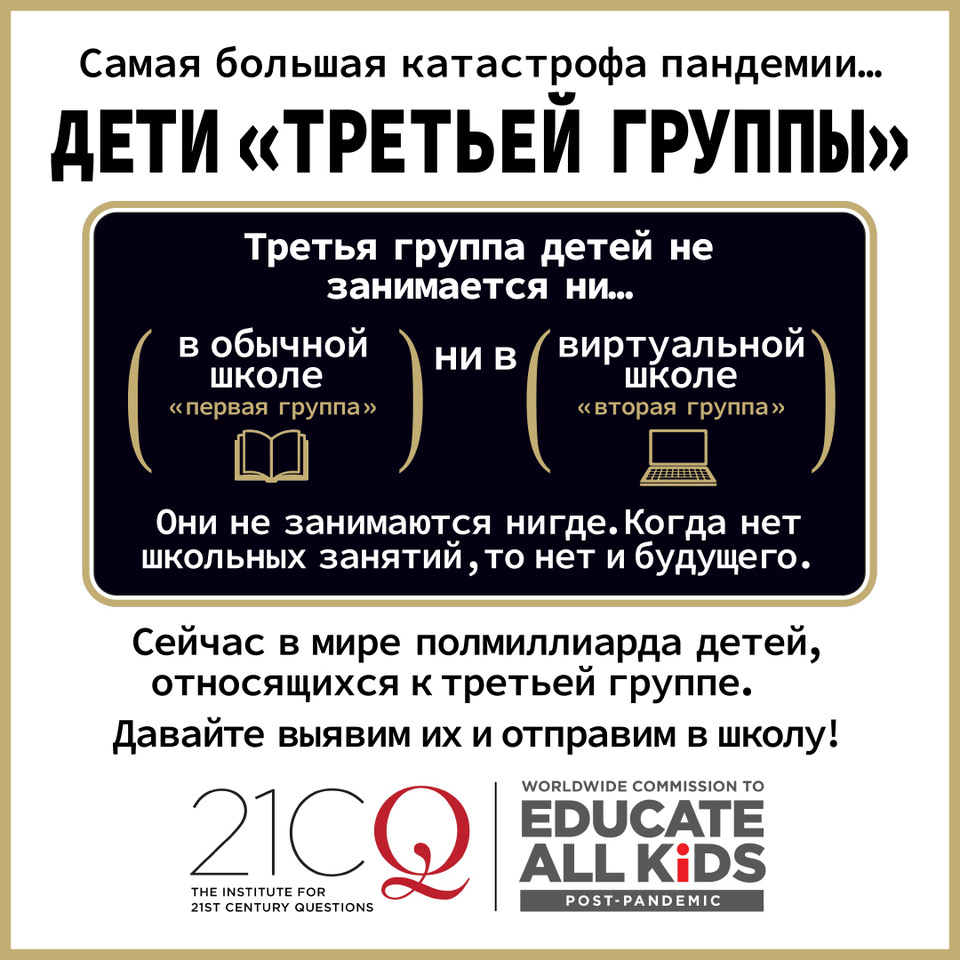
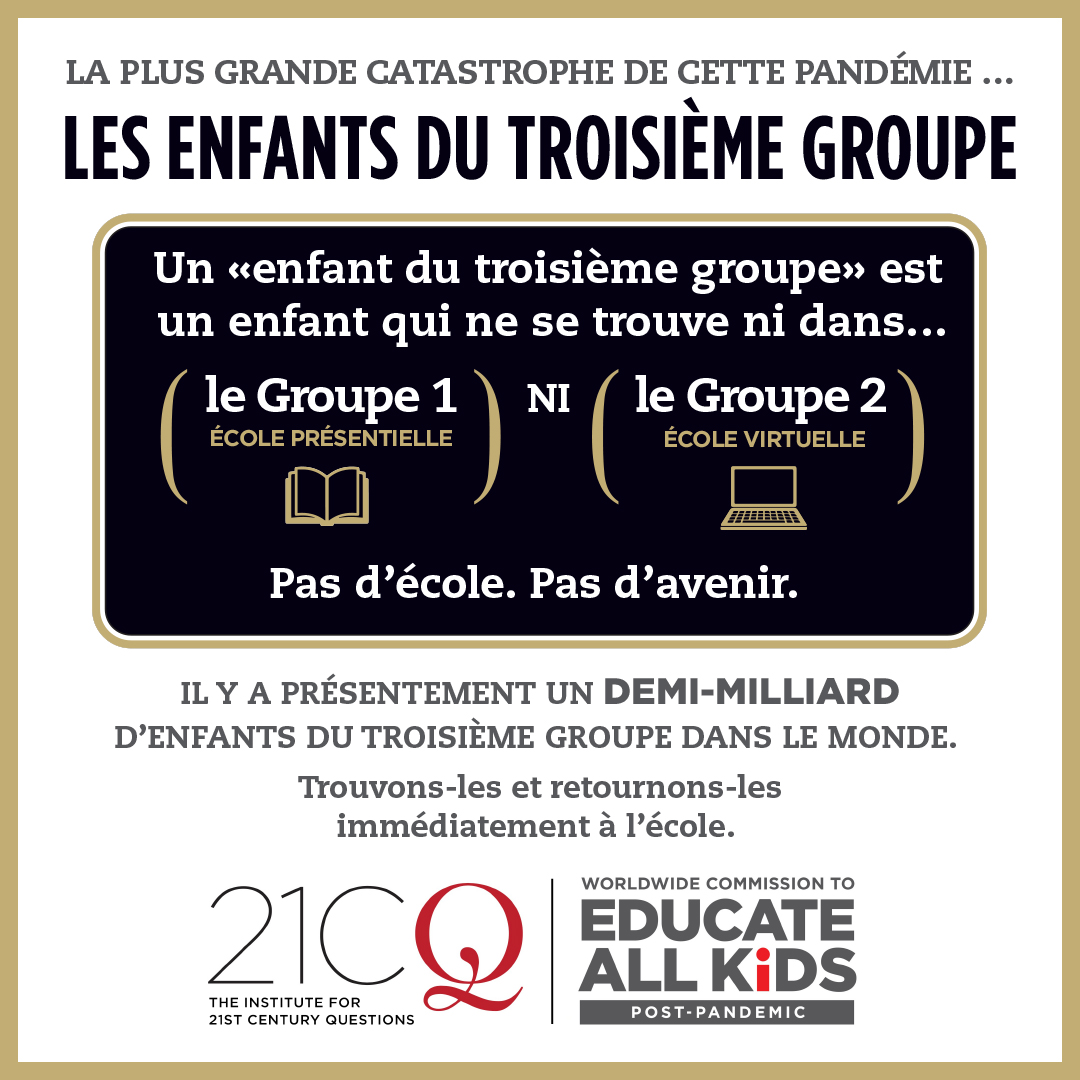

How Did the Third Bucket Catastrophe Happen?
- 1. Immediate “Internet ouster” – a child with no or highly limited access to stable Internet and a stable device is ousted from all schooling as soon as the school closes. (Some ministries of education and schools were able to partially counterbalance this dynamic, although it tended to grow over time as household economic resources diminished over the course of the pandemic.)
- 2. Abusive homes – a child in an abusive home is very often, for all practical intents and purposes, out of all education as soon as schooling goes online. (To the extent that domestic circumstances may have grown more abusive in the context of long lockdowns and school closures, the proportion of students ousted because of abusive homes grew over the course of the pandemic.)
- 3. Homes with no/poor mastery of the language of instruction – a child with no English/French/Spanish/Portuguese in North and South America, no Arabic/Hebrew/Persian in the Middle East, no Bahasa Indonesia in Indonesia, etc., is ousted into the third bucket as soon as schooling goes online. Poor parental ability in the language of instruction evidently compromises the ability of younger learners online, even if they are proficient in the language at the start of their online studies. The same is true for immigrant children forced to learn online before they or their parents understand the native language of instruction.
- 4. Homes with illness or death – Parents, grandparents or guardians who fell ill during the pandemic period (of Covid-19 or other reasons) were, for all practical intents and purposes, unable to support the online studies of children in the “second bucket”, or otherwise unable to support their return to the “first bucket” where any tuition, however small, may have been involved.
- 5. Children with learning or physical disabilities – Children with such disabilities were, more often than not, unable to learn online over time, absent significant countervailing support from schools, ministries or parents.
- 6. Poor or Poorer Homes – Children in households with insufficient or, over time, diminishing economic resources, were in many cases required to go into the work force very early in life.
- 7. Zero Exit Costs from Education for Teenagers – Whereas middle and high school students who fancied dropping out before the pandemic had to face barriers or “costs” to exit education (in the form of physical walls, human communities, hugs from friends, teachers, mentors, guidance councillors and principals), the “costs” of exit from online school (“second bucket” to the “third bucket”) were often simply a matter of turning off a screen. The adolescent could, in many cases, leave all education by shutting off his/her computer/device, without anyone necessarily even being aware of his/her defection from schooling.
- 8. Rich-Kid and Other Paradoxes – In a number of countries, parents decided to “take time off” of school either as a species of “break” or “pause” or, more anxiously, to avoid engaging in the world during the pandemic (including out of fear of sickness). This may have seemed a wise decision at the start, but it occasionally resulted in the child being left behind by the formal school system, unable to reintegrate over time.
- 9. Dozens of other very human dynamics, including increased truancy and collapsed attempts at homeschooling.
21CQ, driven by a deep sense of the duty incumbent on thinking adults, has brought together senior leaders in education, politics, policy, business, culture, sport and communities from around the world, on all continents, in multiple languages, to address this moral and strategic catastrophe.
The Worldwide Commission to Educate All Kids (Post-Pandemic), launched in January 2021, has been the leading international forum and structure for bringing acute awareness to the third bucket crisis and the time-urgency of on-the-ground, at-scale action to find and reintegrate these ousted children into stable education.
Beyond this, the Commission is highly interested in ensuring that the education collapse of the pandemic period is never repeated and pivoting the world’s education systems to post-pandemic stability and, ideally, excellence – that is, in preparation for the post-pandemic world and a complex 21st century.
Goals of the Commission:
- To bring acute awareness to the fact and consequences of hundreds of millions of “third bucket” children, in scores of countries around the world, ousted from all forms of schooling over the course of the Covid-19 pandemic (and other destabilizing events nationally and internationally).
- To encourage and work with competent national, regional/provincial/state and local authorities, as well as school boards and schools themselves, to comprehensively survey, audit and triangulate all cases of children (elementary and secondary levels) ousted from school over the course of the Covid-19 pandemic.
- To urge and work with all national, regional/provincial/state and local authorities, school boards and schools to develop and implement strategies to reintegrate “third bucket” children into formal schooling with the greatest possible speed.
- To work with all national authorities and international agencies to ensure that the “third bucket” catastrophe is never repeated for the balance of the century – including through the development of a major post-pandemic international treaty among the nations to agree never to close schools except in the event of the most extraordinary forces majeures.
- To work with national, regional/provincial/state and local authorities, school boards and schools to pivot post-pandemic education to full stability and, ideally, excellence in preparation for the demands of the 21st century.
Principles of the Commission:
- All children must be schooled with quality and without interruption in order to survive and succeed in the post-pandemic world.
- Strict non-interference: The Commission does not interfere in national, regional or local matters at all. We only bring awareness and provide framing support and advice.
- The Commission is agnostic on the “content” (curricular and extra-curricular alike) of education – that is, it is only interested in the “fact” of education (as opposed to non-education), with general encouragement of “quality” and even “excellence” as key for children’s survival and success in the post-pandemic world.
Commission Chair: Dr. Irvin Studin, President, Institute for 21st Century Questions (Toronto)
Canada:
Lloyd Axworthy (former Minister of Foreign Affairs)
Pierre Pettigrew (former Minister of Foreign Affairs)
Audrey McLaughlin (former federal Leader, New Democratic Party of Canada)
Robert Ghiz, (former Premier, Prince Edward Island)
Susan Aglukark (Inuk Singer/Songwriter, Author & Founder, Arctic Rose Foundation)
Gail Atkinson (retired Elementary School Principal, Québec)
Charles Ungerleider (former Deputy Minister of Education, British Columbia)
Rosemarie Kuptana (Writers and Speaker, Arctic Rose Foundation – Nunavut and Nova Scotia)
Martha Fulford (Professor, Faculty of Medicine, McMaster University)
Mike Aumond (former Secretary to Cabinet/Executive Council, Government of the Northwest Territories)
Edward Mirasty (Director of Education, Prince Albert Tribal Council, Saskatchewan)
Vincent Brittain (Third Level Specialist, Prince Albert Tribal Council, Saskatchewan)
Howard Burston (Director of Operations, Manitoba First Nations Education Resource Centre Inc.)
Bob Sharp (retired Elementary and High School Principal, Yukon)
Kevin O’Connor (Chair, Department of Education, Mount Royal University, Calgary)
Fred Lazar (Professor, Schulich School of Business, York University)
Jaclyn Volkhammer (Elementary School Teacher, York Region District School Board)
Kirby Mitchell (High School Teacher, Peel Region)
Paul Perlon (Head of Emergency Physician Group, Mackenzie Health Hospital, Richmond Hill)
Donna E. Young (Founding Dean, Ryerson Law School)
Sara L. Austin (Founder & CEO, Children First Canada, Calgary)
Paul Stalteri (former Captain and Hall of Famer, Canadian Men’s National Soccer Team)
Linda Ruby, Retired Teacher & Coordinator of Alternative Learning Program for Rural Youth (ULearn), Waterloo Region District School Board (Kitchener-Waterloo)
USA:
Pedro A. Noguera, Dean, USC Rossier School of Education (Los Angeles)
Robert Pianta, Dean, School of Education and Development, University of Virginia (Charlottesville)
Mia Tuan, Dean, College of Education, University of Washington (Seattle)
Nancy Marchand-Martella, Dean, College of Education, Purdue University (West Lafayette, Indiana)
Nancy Rousseau, Principal, Little Rock Central High School (Little Rock, Arkansas)
Drew Furedi, President & CEO, Para Los Ninõs (Los Angeles)
Chandresh Harjivan, Managing Partner, Boston Consulting Group (Washington, DC)
Hilary Darilek, Chief Executive Officer, E.L. Haynes Public Charter School (Washington, DC)
Theresa Axford, Superintendant, Monroe County School District (Key West, Florida)
Sandi Bisceglia, Past President, International Network of Principals’ Centers (The Florida Keys)
Larry Feldman, Past Chair, School Board of Miami-Dade County (Miami)
India:
Sudarshan Ramaswamy, Dean, School of Government and Public Policy, Jindal Global University (New Delhi)
Vimala Ramachandran, Director, Educational Resource Unit (Jaipur and Delhi)
Shantha Sinha, former Chairperson, National Commission for Protection of Child Rights, Government of India (Hyderabad)
Dhir Jhingran, Executive Director, Language and Learning Foundation (New Delhi)
Sri Lanka:
Tara de Mel, former Secretary, Ministry of Education & Vice Chairperson, National Education Commission; Co-Founder, Education Forum Sri Lanka (Colombo)
Pakistan:
Senator (r) Javed Jabbar, former Federal Minister, pro bono activist promoting enrolment and education (Karachi)
Baela Raza Jamil, CEO, Idara-e-Taleem-o-Aagahi (ITA), Centre for Education and Consciousness (Lahore)
Bangladesh:
Manzoor Hasan, Executive Director, Centre for Peace and Justice, BRAC University (Dhaka)
Maimuna Ahmad, Founder & CEO, Teach for Bangladesh (Dhaka)
United Kingdom:
Geoff Mulgan, Professor, University College London & former Head of the Prime Minister’s Strategy Unity (London)
Andrew Ratcliffe, Executive Director, Impact on Urban Health (London) and Past Managing Director, Tony Blair Africa Governance Initiative
Sam Freedman, CEO, Education Partnerships Group (London)
Alice Wilcock, Head of Education, The Centre for Social Justice (London)
Haiti:
Charles Tardieu, former Minister of Education of Haiti (Port-au-Prince)
Nesmy Manigat, former Minister of Education of Haiti (Port-au-Prince)
Roller Saint-Pierre, Director-General, Institut haïtien de formation en sciences de l’éducation; former Chief of Staff, Ministry of Education (Port-au-Prince)
Anouk Ewald, Director of the Institut supérieur de formation, recherche et innovation en éducation (Innov-Ed/UniQ) (Port-au-Prince)
Argentina:
Silvina Gvirtz, Vice-Minister of Education, Argentina (Buenos Aires)
Austria:
Belachew Gebrewold, Professor and Department Head, MCI Management Center Innsbruck (Innsbruck)
Nils Mevenkamp, Professor of Statistics & Empirical Social Research, MCI Management Center Innsbruck (Innsbruck)
Uganda:
Fiona M. Kiggundu, Executive Director, Project Princess Initiative (Kampala, Kalungu & Masaka)
Alice Esther Biira, Board Member & Science Instructor, Project Princess Initiative (Kampala, Kalungu & Masaka)
Senegal:
Bakary Sambe, Director, Timbuktu Institute-African Center for Peace Studies, Senegal (Dakar)
Philippines:
Rhodora Angela F. Ferrer, Private Education Assistance Committee (Manila)
Kyrgyzstan:
Elena Dubinina, Principal, Innovative School-Gymnasium No. 4-Yuri Gagarin (Mailuu-Suu)
Bermet Tursunkulova, Professor & Director of Development, American University of Central Asia (Bishkek)
Ukraine:
Eduard Afonin, Professor, National Academy of Public Administration (Kyiv)
Aksana Filipishina, Representative of the Commissioner for Children’s and Family Rights (Kyiv)
Israel:
Ram Shmueli, Head, Public National Board of Education (Tel Aviv)
Yossi Baidatz, CEO, The Center for Educational Technology (Tel Aviv)
Russia:
Irina Mersianova, Director, Research Centre on Civil Society and the Non-Profit Sector, Higher School of Economics (Moscow)
Italy:
Monica Mincu, Associate Professor of Education, Università degli Studi di Torino & Member, Education/Learning & Innovation UNESCO Team (Turin)
Georgia:
Ketevan Zhvania-Tyson, Trainer and Youth Worker, Non-formal Education Youth Centre “Sunny House” (Tbilisi)
Manana Tevzadze, Head of British Department, University of Georgia (Tbilisi)
Serbia:
Vera Arezina, Assistant Professor, Faculty of Political Science, University of Belgrade (Belgrade)
Armenia:
Vahram Poghosyan, Director, Participatory School Educational Foundation (Yerevan)
Haykuhi Hayrapetyan, Project Leader, “Regeneration” (Yerevan)
Costa Rica:
Jorge Vargas Cullell, Director, Programa Estado de la Nación (San José)
Jamaica:
Sharna Grandison, Sixth Form Supervisor & English Teacher, Holy Childhood High School (Kingston)
Canute Fagan, Dean of Discipline, Calabar High School (Kingston)
Diana Thompson, Student Assessment Unit, Ministry of Education, Youth and Information of Jamaica (Kingston)
Côte d’Ivoire:
Koffi Dodji Honou, Stanford Fablearn Fellow (Abidjan)
Ghana:
Gaskin B. Dassah, Coordinator, Northern Network for Education Development (Tamale)
Wedad Sayibu, Program Director, School for Life (Tamale)
Lebanon:
Samir Costantine, Founder, General Managet & Consultant, Waznat Consultancy and Training (Beirut)
Romania:
Adrian Hatos, Professor, University of Oradea and Romanian Senator (Bucharest)
Colombia:
Costanza Liliana Alarcon Parraga, Deputy Minister of Education of Colombia (Bogota)
Ana Bolena Escobar, Professor, Secretary of Education, Palmira (Palmira)
Pablo Jaramillo Quintero, Director General, Allianza Educativa (Bogota)
Poland:
Stanislaw Alwasiak, Director, Centre for Social Innovation Research and Development, Jesuit University (Krakow)
Peru:
Ines Kudo, Founder & CEO, Tinkuy Marka Academy (Lima)
Sandra Marcone, Executive Director, CulturaDigital.pe (Lima)
Nepal:
Bal Chandra Luitel, Professor of STEAM Education, Kathmandu University (Dhulikhel)
Mexico:
Elisa Bonilla-Rius, Partner, BO TH Praxis Estrategica (Mexico City)
Brazil:
Diana Goncalves Vidal, Dean, Brazilian Studies Institute, University of Sao Paulo; Former President, Brazilian History of Education Society; Former President, Committee for Education, National Council for Research (Sao Paulo)
Maldives:
Abdulla Rasheed Ahmed, Minister of State for Education & Head of National Institute of Education (Malé)
St. Lucia:
Florentia Popo, Former Programme Coordinator, Sacred Sports Foundation (Gros Islet)
Chile:
Jose Weinstein, Director, Education Leadership Program, Faculty of Education, Universidad Diego Portales (Santiago)
Bhutan:
Sangay Thinley, Former Health & Education Secretary of Bhutan (Thimphu)
Ecuador:
Susana Araujo Fiallos, Former Deputy Minister of Education of Ecuador (Quito)
Paraguay:
Marta Lafuente, Former Minister of Education of Paraguay (Asuncion)
Barbados:
Mosiah Hoyte, Primary School Educator & Social Worker/Counsellor (Bridgetown)
Netherlands:
Ton Duif, Founder & Past President, Dutch Association of Principals; Past President, World Education Forum; Past Chair, European School Heads Association (Amsterdam)
Uruguay:
Juan Pedro Mir, President, EDUY21 (Montevideo)
Hungary:
Eszter Salamon, Director, Parents International (Budapest)
Bolivia:
Luz Jimenez Quispe, Professor, Fe y Alegría & San Simón University (Cochabamba)
Bulgaria:
Maria Gaidarova, Deputy Minister of Education and Science of Bulgaria (Sofia)
Croatia:
Lana Jurko, Executive Director, Network of Education Policy Centers (Zagreb)
Montenegro:
Biljana Maslovaric, Professor of Preschool Education, University of Montenegro & Head, Pedagoski centar (Podgorica)
Albania:
Rozeta Hoxhallari, Executive Director, Children are the Future (Tirana)
Bosnia and Herzegovina:
Nedim Krajisnik, Executive Director, Step by Step (Sarajevo)
Public Working Schedule for the Commission – 2021-22 (does not include informal and bespoke forums and operations)
National Press Conference – Tuesday, January 26 – 10.30am EST
International Press Conference – Thursday, January 28 – 9.30am EST / 2.30pm GMT
Friday, February 5 – Meeting of the Canadian Delegation of the Commission
Friday, February 12 – Meeting of the Entire Worldwide Commission
Monday, February 22 – Canadian Open Conference
Friday, February 26 – Worldwide Commission Open Conference
Friday, March 12 – Worldwide Commission All-USA Conference
Friday, March 19 – Worldwide Commission All-South Asia Conference
Friday, March 26 – Worldwide Commission All-Latin America Conference
Friday, April 16 – Global Summit of the Worldwide Commission to Educate All Kids (Post-Pandemic) – From Strategy to Action: Finding and Reintegrating the “Third Bucket Kids”
Friday, April 30 – All-of-Canada Summit of the Worldwide Commission to Educate All Kids (Post-Pandemic) – From Strategy to Action: Finding and Reintegrating Canada’s “Third Bucket Kids”
May 21 – All- Latin America Summit – Noon EST – 3pm EST
June 11 – All-South Asia Summit – 9am IST – Noon IST
June 18 – All-USA Summit – Noon EST – 3pm EST
August 16 – All-of-Europe Conference – 2pm BST – 4pm BST
August 17 – All-of-Canada Summit on Fall Return & Recovery – Noon EST – 2.30pm EST
October 22 – Global Summit on the Return to School
December 20 – Whole-of-Asia (Mideast, East Asia, South Asia, Southeast Asia, North Asia) Summit on the Return to School
Monday August 22, 2022 – All-Caribbean Summit of the Worldwide Commission to Educate All Kids (Post-Pandemic)
Fall 2022 – All-of-Africa Conference on Third Bucket Kids
The Commission now pivots decisively to in-person summits and conferences, bilateral briefings, and on-the-ground efforts, at scale, to find and reintegrate third bucket kids into real, stable education with maximum speed.
July 29-30, 2023 – In-Person Global Summit of the World Wide Commission to Educate All Kids (Post-Pandemic) – Toronto, Canada


 21CQ
21CQ 









